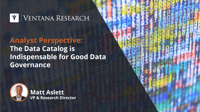Ventana Research’s Data Lakes Dynamics Insights research illustrates that while data lakes are fulfilling their promise of enabling organizations to economically store and process large volumes of raw data, data lake environments continue to evolve. Data lakes were initially based primarily on Apache Hadoop deployed on-premises but are now increasingly based on cloud object storage. Adopters are also shifting from data lakes based on homegrown scripts and code to open standards and open...
Read More
Topics:
Business Intelligence,
Cloud Computing,
Data Governance,
Data Management,
Data,
data operations,
analytic data platforms,
Operational Data Platforms,
Analytics and Data,
AI and Machine Learning
I have recently written about the organizational and cultural aspects of being data-driven, and the potential advantages data-driven organizations stand to gain by responding faster to worker and customer demands for more innovative, data-rich applications and personalized experiences. I have also explained that data-driven processes require more agile, continuous data processing, with an increased focus on extract, load and transform processes — as well as change data capture and automation...
Read More
Topics:
Cloud Computing,
Data Management,
Data,
data operations,
Analytics and Data
The data catalog has become an integral component of organizational data strategies over the past decade, serving as a conduit for good data governance and facilitating self-service analytics initiatives. The data catalog has become so important, in fact, that it is easy to forget that just 10 years ago it did not exist in terms of a standalone product category. Metadata-based data management functionality has had a role to play within products for data governance and business intelligence for...
Read More
Topics:
business intelligence,
Data Governance,
Data Management,
Data,
data operations,
Analytics and Data
I have recently written about the importance of healthy data pipelines to ensure data is integrated and processed in the sequence required to generate business intelligence, and the need for data pipelines to be agile in the context of real-time data processing requirements. Data engineers, who are responsible for monitoring, managing and maintaining data pipelines, are under increasing pressure to deliver high-performance and flexible data integration and processing pipelines that are capable...
Read More
Topics:
Big Data,
Cloud Computing,
Data Management,
Data,
data operations
When joining Ventana Research, I noted that the need to be more data-driven has become a mantra among large and small organizations alike. Data-driven organizations stand to gain competitive advantage, responding faster to worker and customer demands for more innovative, data-rich applications and personalized experiences. Being data-driven is clearly something to aspire to. However, it is also a somewhat vague concept without clear definition. We know data-driven organizations when we see them...
Read More
Topics:
embedded analytics,
Analytics,
Business Intelligence,
Data Governance,
Data Integration,
Data,
Digital Technology,
natural language processing,
data lakes,
data operations,
Streaming Analytics,
Digital Business,
Data Platforms,
Streaming Data Events,
Analytics and Data,
AI and Machine Learning
I previously described the concept of hydroanalytic data platforms, which combine the structured data processing and analytics acceleration capabilities associated with data warehousing with the low-cost and multi-structured data storage advantages of the data lake. One of the key enablers of this approach is interactive SQL query engine functionality, which facilitates the use of existing business intelligence (BI) and data science tools to analyze data in data lakes. Interactive SQL query...
Read More
Topics:
business intelligence,
Analytics,
Cloud Computing,
Data,
Digital Technology,
data lakes,
data operations,
Data Platforms,
Analytics and Data,
AI and Machine Learning
I recently wrote about the potential benefits of data mesh. As I noted, data mesh is not a product that can be acquired, or even a technical architecture that can be built. It’s an organizational and cultural approach to data ownership, access and governance. While the concept of data mesh is agnostic to the technology used to implement it, technology is clearly an enabler for data mesh. For many organizations, new technological investment and evolution will be required to facilitate adoption...
Read More
Topics:
Analytics,
Business Intelligence,
Data Governance,
Data Integration,
Data,
data operations,
Data Platforms,
Streaming Data Events,
AI and Machine Learning
I recently wrote about the importance of data pipelines and the role they play in transporting data between the stages of data processing and analytics. Healthy data pipelines are necessary to ensure data is integrated and processed in the sequence required to generate business intelligence. The concept of the data pipeline is nothing new of course, but it is becoming increasingly important as organizations adapt data management processes to be more data driven.
Read More
Topics:
business intelligence,
Analytics,
Data Governance,
Data Integration,
Data,
Digital Technology,
Digital transformation,
data lakes,
data operations,
Digital Business,
Data Platforms,
Streaming Data Events,
Analytics and Data,
AI and Machine Learning
Data mesh is the latest trend to grip the data and analytics sector. The term has been rapidly adopted by numerous vendors — as well as a growing number of organizations —as a means of embracing distributed data processing. Understanding and adopting data mesh remains a challenge, however. Data mesh is not a product that can be acquired, or even a technical architecture that can be built. It is an organizational and cultural approach to data ownership, access and governance. Adopting data mesh...
Read More
Topics:
business intelligence,
Analytics,
Data Governance,
Data Integration,
Data,
Digital Technology,
Digital transformation,
data lakes,
data operations,
Digital Business,
Data Platforms,
Streaming Data Events,
Analytics and Data
Despite widespread and increasing use of the cloud for data and analytics workloads, it has become clear in recent years that, for most organizations, a proportion of data-processing workloads will remain on-premises in centralized data centers or distributed-edge processing infrastructure. As we recently noted, as compute and storage are distributed across a hybrid and multi-cloud architecture, so, too, is the data it stores and relies upon. This presents challenges for organizations to...
Read More
Topics:
business intelligence,
Analytics,
Data Governance,
Data,
data operations,
Data Platforms,
AI and Machine Learning




















